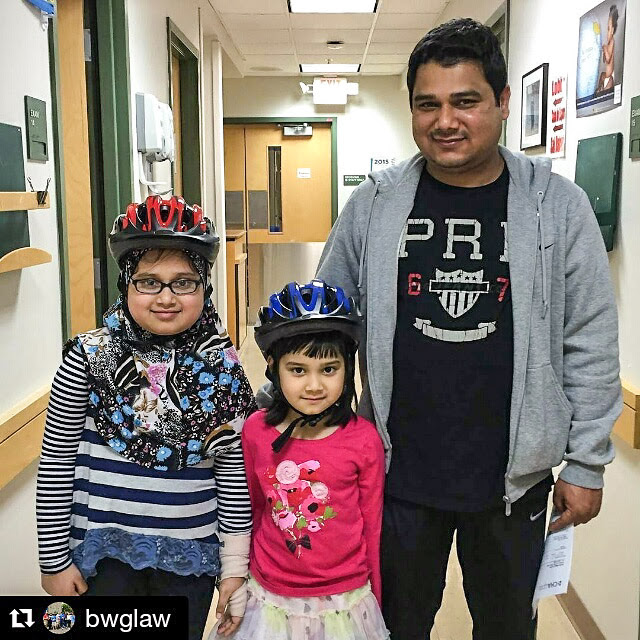Posts Tagged ‘Cambridge’
Partnering With the Cambridge Police Department to Protect Kids Riding Bikes
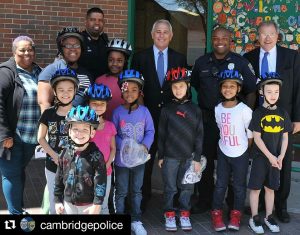
From 2016: Attorney Ron Gluck and Attorney David White joined Cambridge police officers and students at the Cambridgeport School. Breakstone, White & Gluck was there to donate bicycle helmets as part of our Project KidSafe campaign.
Read Cambridge Police Department’s 2017 National Bike Safety Month announcement.
Breakstone, White & Gluck is pleased to partner with the Cambridge Police Department again to encourage children to wear bicycle helmets during National Bike Safety Month. As part of our Project KidSafe campaign, we recently donated 180 bicycle helmets for Cambridge police officers to give to children who need one.
Over the past four years, Breakstone, White & Gluck and our Project KidSafe campaign have donated more than 10,000 bicycle helmets in Boston, Cambridge, Somerville and other communities. In Cambridge, we have worked with the police department, as well as CYCLE Kids, a non-profit cycling organization which teaches children safe riding and healthy eating here in Massachusetts and across the country.
Bicycle helmets are a critical tool for cyclists. The National Highway Traffic Safety Administration (NHTSA) has reported bicycle helmets are 85-88 percent effective in preventing head and brain injuries. Helmets make all the difference for cyclists, especially young children who are vulnerable to injuries as they learn to ride and grow.
Under Massachusetts law, cyclists 16 years old and younger are required to wear helmets. This has been the law for more than 10 years in Massachusetts, yet many children still ride without one. There are many reasons, from the high cost of helmets to the fact that kids often outgrow them quickly. Also, until you are shown, helmets can be challenging to properly fit.
In Cambridge, cycling and pedestrian safety is a paramount topic. As home to more than 100,000 residents, Harvard University and major pharmaceutical companies, Cambridge has some of the most heavily traveled streets in Massachusetts. Over the past year, the city has seen two cyclists killed in bicycle accidents in Inman Square and Porter Square.
Over the next few weeks, Cambridge Police and the Cambridge Community Development Department are hosting a full line-up of events for National Bike Safety Month. Students began the month with Walk to School Day. Over the next few weeks, older cyclists are invited to stop in at community breakfasts, where there will be bike lights and other giveaways. Need tips on fixing your bike? Two bicycle maintenance workshops will be offered on May 17th, along with a citywide “Bow Tie Bike Ride” on May 20th.
Breakstone, White & Gluck Donates Children’s Bicycle Helmets to Boston School and Cambridge Medical Clinic
As part of our Project KidSafe campaign, Breakstone, White & Gluck recently made two donations to help children in Boston and Cambridge ride their bicycles safely.
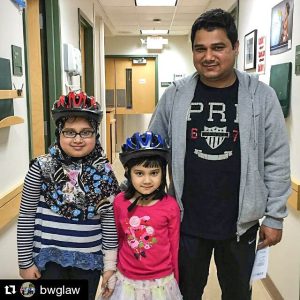
Windsor Street Care Center
Breakstone, White & Gluck was pleased to donate 100 bicycle helmets to the Windsor Street Care Center in Cambridge. This is the second year we have partnered with the center. Doctors and staff give the helmets to children who need one, while also showing parents and older children how to properly fit the helmets themselves.
Haynes Early Education Center
Breakstone, White & Gluck was also pleased to donate 75 bicycle helmets for the Healthy Families Event at Haynes Early Education Center, which is part of the Boston public school system. The school, which is located in Roxbury, serves children in kindergarten and grade 1. The Healthy Families Event was held in late March to provide families with safety information before the Spring cycling season.
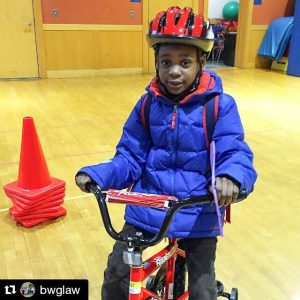
The Importance of Bicycle Helmets
Breakstone, White & Gluck cares about the safety of cyclists. Since 2013, our law firm has donated over 10,000 bicycle helmets to children in eastern Massachusetts through our Project KidSafe campaign.
Our goal is to encourage children to wear bicycle helmets starting early. Wearing a bicycle helmet is a simple and effective way to protect a cyclist from a head injury. But the key is the helmet must be in good condition and properly fit. Parents also play a critical role, by wearing a bicycle helmet to set a good example for their children.
Massachusetts law requires any person 16 years old or younger riding a bicycle to wear a helmet. By wearing a helmet, cyclists can reduce their chance for head injury by 50 percent, according to the Insurance Institute for Highway Safety. Other studies have found bicycle helmets have an even greater impact in protecting children from falls or bicycle accidents.
About Breakstone, White & Gluck
Breakstone, White & Gluck is a Boston personal injury law firm which is committed to the safety of all bicyclists in Massachusetts. We have over 100 years combined experience representing bicyclists injured by the negligence of others. If you, or a member of your family, has been injured in a bicycle incident, please feel free to contact us for a free legal consultation at 800-379-1244 or 617-723-7676 or use our contact form. Thank you and RIDE SAFE!
Breakstone, White & Gluck and Cambridge Police Team Up for Children’s Bike Helmet Giveaway During National Bike Safety Month
With a donation from Breakstone, White & Gluck, the Cambridge Police Department will distribute bicycle helmets to children who need one during National Bike Safety Month.
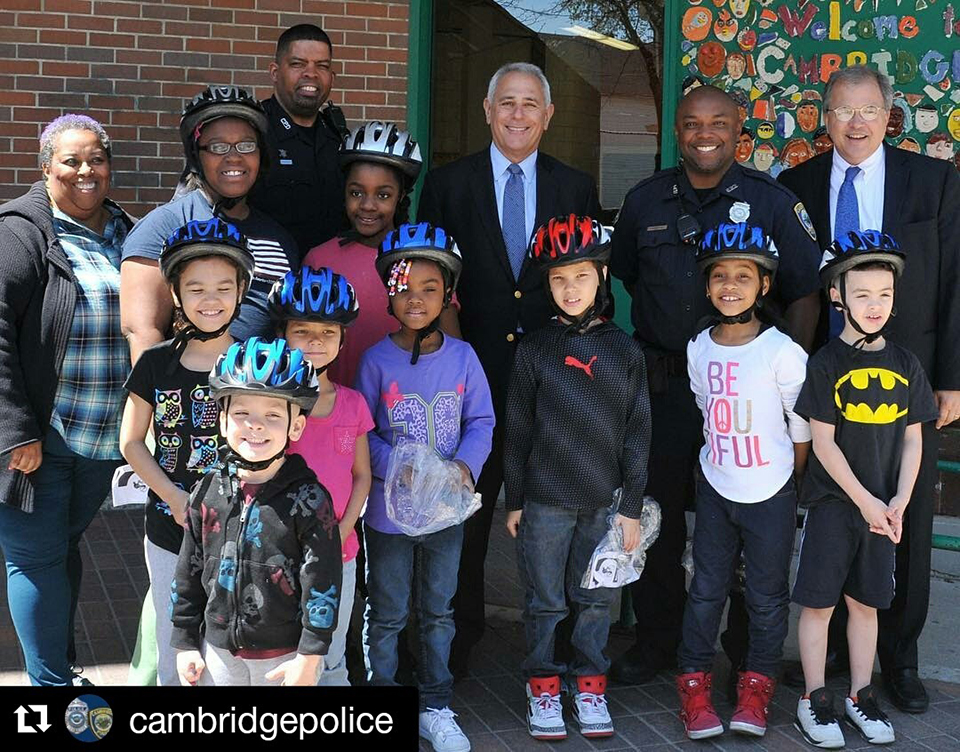
Photo: Attorney Ronald Gluck and David White of Breakstone, White & Gluck gather with children at the Cambridgeport School, Assistant Principal Audrey M. Sturgis and Cambridge police officers Che Santos and Anthony Santiago. Breakstone, White & Gluck was pleased to donate children’s bicycle helmets to the Cambridge Police Department for National Bike Safety Month in May 2016.
Cambridge Police has announced its first “helmet voucher” program as part of its National Bike Safety Month initiatives in May. Police officers will specifically be looking for children who are riding bicycles without a helmet throughout May and hand them a “helmet voucher,” which can be redeemed for a free bicycle helmet at the Cambridge Police Department.
Breakstone, White & Gluck donated 140 bicycle helmets to the Cambridge Police in hopes of keeping children safe and preventing traumatic brain injuries from bicycle accidents. The donation was part of our Project KidSafe campaign, which has donated more than 10,000 bicycle helmets to children since 2013.
Massachusetts law requires any person 16 years old or younger riding a bicycle to wear a helmet. By wearing a helmet, cyclists can reduce their chance for head injury by 50 percent, according to the Insurance Institute for Highway Safety.
This is a special donation and Attorney Ron Gluck and Attorney David White joined Cambridge Police at the Cambridgeport School for an unofficial kick off last week. Here are some photos:
Attorney Ron Gluck and Attorney David White join children at the Cambridgeport School along with Audrey M. Sturgis, assistant principal, and Cambridge police officers Che Santos and Anthony Santiago, to kick off the bike helmet giveaway during National Bike Safety Month.
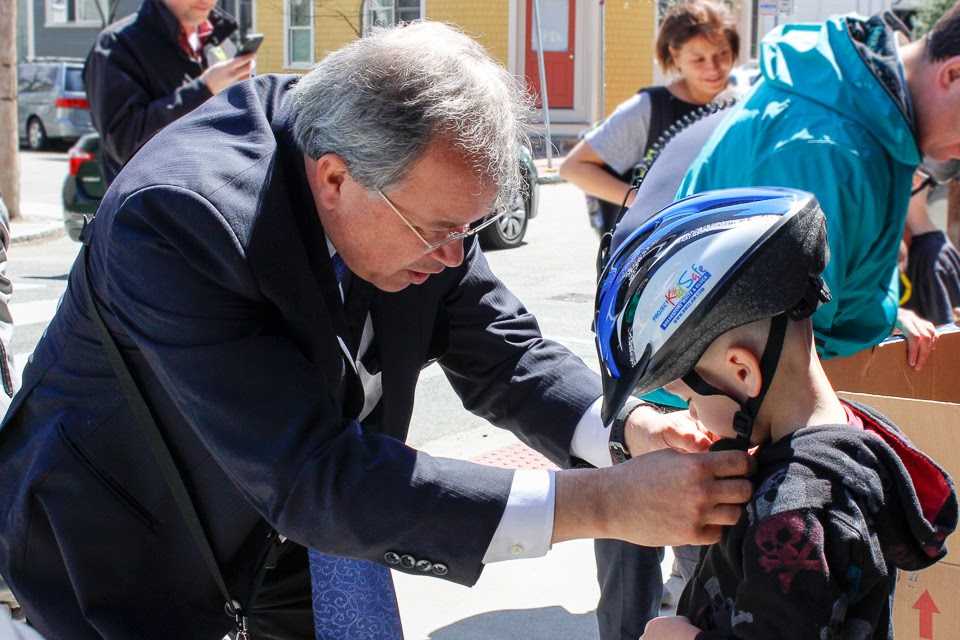
Attorney David White helps a child fit a bicycle helmet.
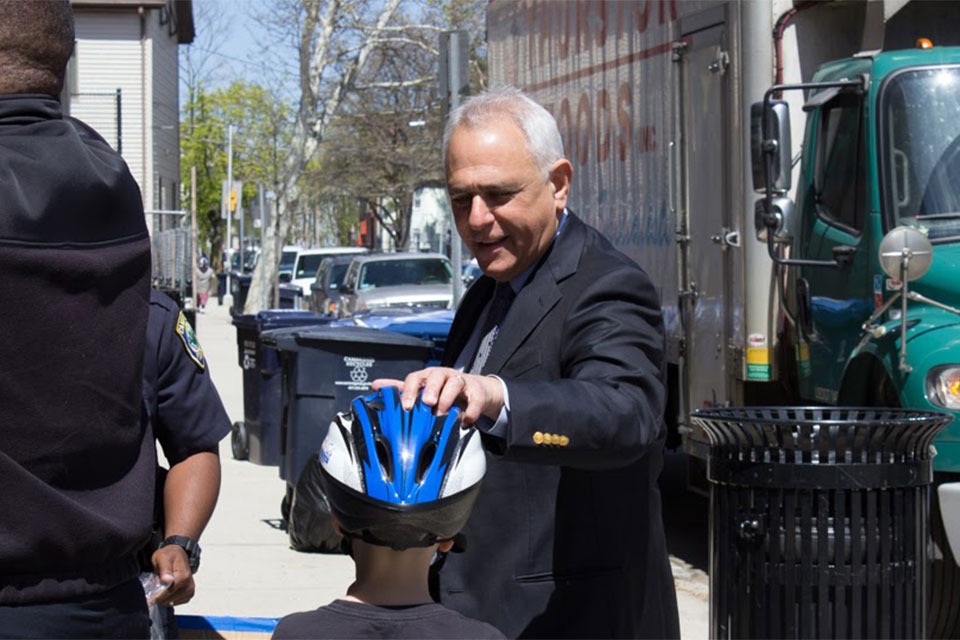 Attorney Ron Gluck finishes fitting a helmet.
Attorney Ron Gluck finishes fitting a helmet.
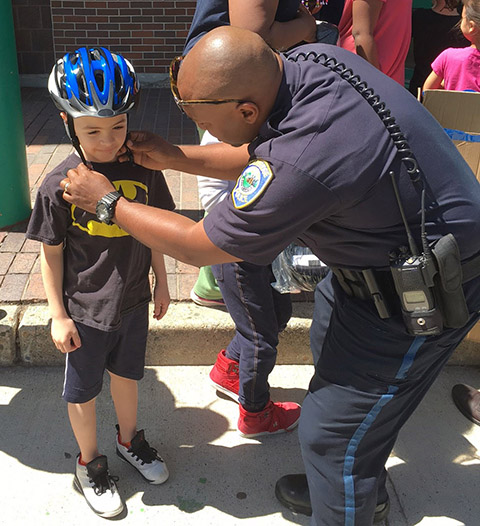 Cambridge police officers will distribute the bicycle helmets – and also show children how to properly fit them.
Cambridge police officers will distribute the bicycle helmets – and also show children how to properly fit them.
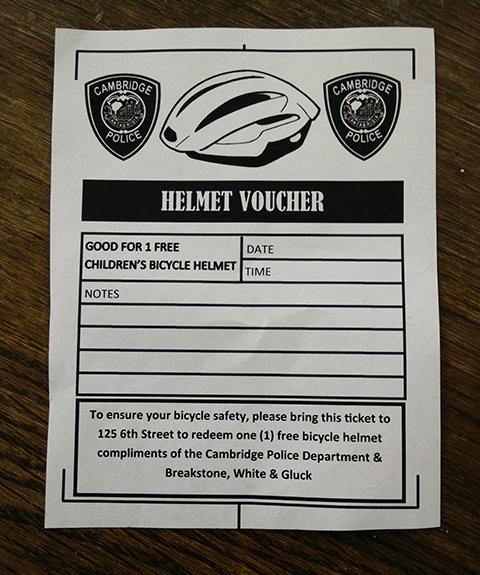 Cambridge Police will distribute these vouchers to children who are not wearing bicycle helmets during May.
Cambridge Police will distribute these vouchers to children who are not wearing bicycle helmets during May.
For more information on how to properly fit a bicycle helmet, visit our Project KidSafe webpage.
About Breakstone, White & Gluck
Breakstone, White & Gluck is a Boston personal injury law firm which is committed to the safety of all bicyclists in Massachusetts. We have over 100 years combined experience representing bicyclists injured by the negligence of others. If you, or a member of your family, has been injured in a bicycle incident, please feel free to contact us for a free legal consultation at 800-379-1244 or 617-723-7676 or use our contact form. Thank you and RIDE SAFE!
More than 33,000 Child Car Seats Recalled
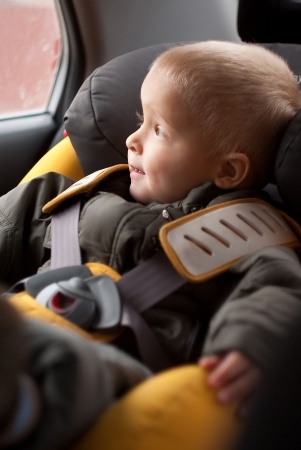 Combi USA announced a recall of over 33,000 car seats last week and said parents should expect repair kits starting in February.
Combi USA announced a recall of over 33,000 car seats last week and said parents should expect repair kits starting in February.
Combi USA recalled its Coccorro, Zeus, Turn and Zeus 360 models made through January 2013. The National Highway Traffic Safety Administration (NHTSA) reports the seat straps do not meet minimum requirements. Children may not be properly secured in case of a car accident.
The Charlotte, N.C. company said one part of the harness failed strength tests, but the harness as a whole meets safety standards. Seats made after January 2013 do not have this defect.
Combi USA will notify owners who have registered their products and mail out free harness replacement kits starting in February.
What to Know About Child Safety Seats
Choosing a safe car seat and learning how to properly install it is a struggle for many parents. There are a number of resources to help make the process easier.
Product Recalls.The Consumer Product Safety Commission (CPSC) website provides updates on product recalls. This recall was reported in the media and not listed on the website, but most recalls can be found there.
NHTSA. The National Highway Traffic Safety Administration provides online resources about child seat safety ratings.
State of Massachusetts. In Massachusetts, children must use some type of child passenger safety seat until they are 8 years old or weigh 57 pounds. All seats must meet federal standards. Read what types are appropriate for each age.
Local Police Departments and Organizations. Your local police may have an officer who has been specially trained to fit car seats. This is a free service.
Related:
Combi USA Recalls More than 33,000 Child Seats, ABC News.
Read More
Drivers Age 25-39 Admit to Most Texting While Driving
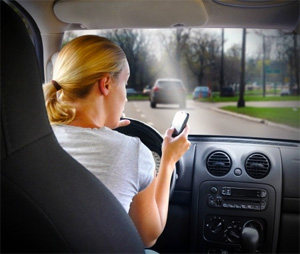 One in four drivers admitted to texting while driving in the past month, a new AAA survey reports. While teenagers often get the most blame, this survey found drivers age 25-39 are actually the worst offenders.
One in four drivers admitted to texting while driving in the past month, a new AAA survey reports. While teenagers often get the most blame, this survey found drivers age 25-39 are actually the worst offenders.
Texting while driving is against the law in Massachusetts and 40 other states. But in the new survey, 26 percent of drivers reported sending a text or e-mail while driving in the past month. Among drivers age 25-39, 45 percent admitted to texting or sending an e-mail while driving and 10 percent admitted they did so fairly often.
These drivers were also most likely to drive while talking on a handheld cell phone, with 82 percent admitting to doing so in the past month and 43 percent saying they did it fairly often. Talking on a cell phone while driving is still legal in many states, including Massachusetts, but legislation is pending to restrict that activity.
Drivers 19-24 were second most likely to text while driving, with 42 percent confessing to it at least once in the previous month and 11 percent saying they did it fairly often.
Drivers age 16-18 were third most likely, followed by drivers ages 40-59, then 60 and older. Drivers age 75 and older were the least likely, but even one percent of them admitted to texting and 31 percent admitted to talking on a handheld cell phone while driving in the previous month.
A few notes:
- One out of 10 fatal car crashes involves distraction, resulting in more than 3,000 deaths per year in the U.S.
- At any given daylight moment, approximately 660,000 drivers in the U.S. are using cell phones or manipulating electronic devices while driving, according to the National Highway Traffic Safety Administration (NHTSA).
- Using a cell phone while driving quadruples your chance for being involved in a car accident, according to AAA.
- Talking on a handheld cell phone is banned in 12 states and the District of Columbia. It is legal in Massachusetts and the rest of New England. Cell phone use is restricted for novice drivers in 37 states and the District of Columbia.
- Texting while driving is banned for drivers in 41 states and the District of Columbia, including Massachusetts. It is also banned in other New England states. Six other states have bans prohibiting novice drivers from texting.
- Using hands-free devices or infotainment systems is not safer than using handheld cell phones or texting, according to a study by a University of Utah research team. The study last summer tested voice-to-text technology which allows drivers to talk on the phones, send texts and e-mails and use social media without touching a cell phone. The study measured driver alertness using cameras mounted inside the vehicle and diagnostic tools to measure reaction time and brain activity.
- Researchers ranked voice-to-talk technology as more dangerous than using a handheld cell phone and listening to a radio.
Related:
Map of handheld cell phone bans, Insurance Institute for Highway Safety
Hands-free talking, texting is unsafe, University of Utah
Teens report texting or using phone while driving significantly less often than adults, AAA Read More
Use Space Heaters and Home Heating Equipment Safely
Home heating equipment is the second leading cause of home fires in Massachusetts. Because half of all home heating fires occur in December, January and February, now is the time to consider if you are heating your home safely.
The most important step is to make sure your smoke alarm has working batteries. Also, have your home heating equipment checked and serviced by a qualified professional each year. They can identify problems and clear any debris in your chimney or vents. Any obstruction increases the chance of fire and can lead to carbon monoxide poisoning, which can be fatal. Other ways to protect your family and home:
Space Heaters
Space heaters cause 33 percent of all home heating fires and 81 percent of home heating fire deaths, according to National Fire Protection Association (NFPA). If you have an older model, consider purchasing a new one with an automatic shut-off feature. Also, search for your model on the Internet to make sure it has not been recalled. The best resource is the Consumer Product Safety Commission website.
Use space heaters on even surfaces and always keep them three feet away from combustibles, such as bed spreads and clothing. Also keep children and pets at least this far away.
Do not use an extension cord and use space heaters on a flat surface where they will not tip over. Remember to turn it off before you go to sleep or if you leave the room.
No Overloaded Electrical Outlets
Be careful not to overload electrical outlets. Space heaters draw a large amount of electricity. Shift around appliances if you think you may be overloading an outlet.
Keep Vents Clear
Monitor your indoor and outdoor heating vents throughout the winter. When it snows, clear your outside heating vents even before you shovel your driveway.
Wood, Coal and Pellet Stoves
In Massachusetts, you need a building permit to install wood, pellet or coal burning stoves and fireplaces. They must be inspected by a local building inspector prior to use.
Last year, there were over 800 fire incidents in Massachusetts involving chimneys, fireplaces and woodstoves. Many result from a build-up of creosote, a by-product of burning wood.
Read the manufacturer’s instructions on how to use your heating equipment. Do not use flammable liquids to start a fire. For fireplaces, check that the damper is open before starting a fire so there is not a build-up of smoke and carbon monoxide.
Use the fireplace screen to prevent flames and sparks from moving outside the fireplace and causing burns and injuries. Do not close the damper until the fire is fully out.
When finished, dispose of ashes in a metal ash can and keep it outside your home and garage. Also keep it away from porches and decks.
Cooking
Make sure you have proper ventilation before you start cooking. Do not use grills inside your home.
Related:
Heating fire safety: Wood Stoves, Space Heaters and Fireplaces, U.S. Fire Administration.
Read More
Our Thanksgiving Wishes
 The lawyers and staff at Breakstone, White & Gluck wish you a very Happy Thanksgiving. We hope you enjoy this special time with family over a tasty meal (with plenty of leftovers!). We also appeal to you to take a few steps for safety’s sake:
The lawyers and staff at Breakstone, White & Gluck wish you a very Happy Thanksgiving. We hope you enjoy this special time with family over a tasty meal (with plenty of leftovers!). We also appeal to you to take a few steps for safety’s sake:
Drive Safely. AAA projects nearly 39 million U.S. travelers will drive 50 miles or more from home this Thanksgiving holiday weekend. If you can, avoid traveling during busy times such as Thanksgiving Eve. No matter when you drive, make sure you pay attention, monitor traffic reports, never drive when you are drowsy and start your trip with a full tank of gas.
Distraction-Free Driving. Commit to not use your cell phone while driving, especially in traffic congestion. Do not make phone calls or text while driving, the latter of which is against the law in Massachusetts. If you are using your cell phone as a GPS, have someone in the passenger seat handle your phone.
Smoke Alarm Batteries. Change your smoke alarm batteries, if you did not do so in early November, when Daylight Saving Time ended. About two-thirds of home fire deaths occur in homes with no smoke alarms or working smoke alarms, according to the Consumer Product Safety Commission (CPSC). You should test the batteries in all your home’s smoke alarms monthly.
Cooking Fires. The threat of a cooking fire triples on Thanksgiving, according to the CPSC. Stay in the kitchen while frying, grilling or broiling food. If you have to step away, turn off the stove.
Prevent Food Poisoning. A few reminders are regularly wash your hands in the kitchen, along with food surfaces and utensils. Separate raw meat and poultry from other food. Cook your turkey to a safe minimum internal temperature of 165 degrees. The Centers for Disease Control and Prevention also recommends cooking your stuffing in a separate dish outside the turkey. As for leftovers, make sure to eat within three or four days.
Keep Children Away From Food. Keep young children out of the kitchen while cooking. They could spill hot liquids or scald their skin on the oven.
Look for Hazards to Children. If you are at an unfamiliar home, do a visual scan of potential dangers for children. Keep them away from brick fireplaces, garage entrances and other hazards which could cause them injury.
Turkey Fryers. The National Fire Protection Association discourages use of turkey fryers. But if you use one, make sure you take it outside, a good distance from your home or any structure. Do not cook on the roof of apartment or condominium buildings. Dress so you are prepared to deal with hot oil spills and never leave the fryer unattended.
No Drinking and Driving. Do not drive after consuming alcohol. You risk seriously injuring yourself or someone else in a car accident. You could also be criminally charged.
This message is especially important on Thanksgiving. Mothers Against Drunk Driving (MADD) reports drunk driving deaths continue to increase during the holiday season. Many accidents occur on Thanksgiving Eve – a day it calls Blackout Wednesday – and the early hours of Thanksgiving Day. In 2010 alone, 174 people in the U.S. were killed during the Thanksgiving holiday weekend, in addition to many others who were injured.
Related:
14 Things to Know About Traveling on Thanksgiving Weekend in Massachusetts, North Reading Patch.
Boston Traffic Reports, Boston.com.
It’s Turkey Time: Safely Prepare Your Holiday Meal, Centers for Disease Control and Prevention.
Thanksgiving Home & Travel Safety Tips, Mass.gov.
Read More
Remember to Change Your Smoke Alarm Batteries
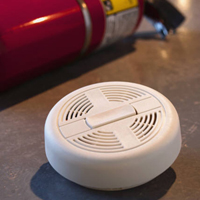 As Daylight Saving Time ends Sunday, we all have a very important chore: changing the batteries in our smoke alarms and carbon monoxide (CO) detectors. The good news is we have an extra hour in the day to get that chore done.
As Daylight Saving Time ends Sunday, we all have a very important chore: changing the batteries in our smoke alarms and carbon monoxide (CO) detectors. The good news is we have an extra hour in the day to get that chore done.
Smoke alarms provide necessary warning for us to act in a fire. Each year, more than 2,200 people die in unintentional home fires in the United States. The greater tragedy is nearly two-thirds of these deaths occur in homes with no smoke alarms or ones which do not work.
Here are a few additional suggestions for Boston and Massachusetts residents:
- You should have working smoke alarms on every level of your home, inside and outside sleeping areas.
- Purchase fire extinguishers for your kitchen, basement, work areas, and garage. Check them every few months to remind yourself of where they are, and make sure they are properly charged.
- Replace smoke alarms every 10 years and carbon monoxide detectors every five years.
- Talk to your family, roommates and landlord about your fire evacuation plan.
- Walk through your home and apartment and practice your fire evacuation plan. In an emergency, you and others may have to pass through unfamiliar areas.
- If you are a Boston college student renting an apartment, make sure you and your roommates are following house rules for cooking and that no one is smoking in the living area.
- Report any potential fire hazards to landlords promptly, including blocked access ways and electrical irregularities.
October Sees the Most Auto Accident Claims from Teen Drivers
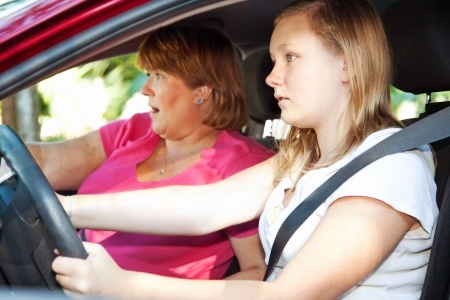 Sept. 30 will mark three years since the state of Massachusetts strengthened its laws for teen drivers.
Sept. 30 will mark three years since the state of Massachusetts strengthened its laws for teen drivers.
Under the Safe Driving law, which took effect in 2010, teen drivers age 16 ½ to 18 are banned from all cell phone use and there is no texting while driving for operators of any age. The Junior Operator Law, which was passed in 2007, bans teen drivers from carrying passengers under the age of 18, except siblings. They also cannot drive between the hours of 12:30 a.m. and 5:00 a.m., unless accompanied by a parent.
Massachusetts is not alone; most states now have Graduated Licensing Laws restricting teen drivers in some way. In 47 states, novice drivers have passenger restrictions and 48 states limit nighttime driving. Teens are banned from all cell phone use in 37 states.
There is good reason for the laws: For each mile of roadway, teens age 15- to 20-years-old are three times more likely to die in a car accident than other drivers, according to the National Highway Traffic Safety Administration.
Now is a good time to observe how well your teen driver is obeying the laws. Every year, the AAA Foundation for Traffic Safety reports June, July and August see the largest number of teen driving deaths. But one nationwide company, State Farm Insurance, reports October is another dangerous time. It sees the most claims from 16- and 17-year-old drivers in this month, up 15 percent from other times.
Teen drivers get into auto accidents because they lack experience, are sensitive to distractions and do not always follow the rules. A few tips for helping your Massachusetts teen driver:
Say No to Teens Using Their Cell Phones. Many teens are texting while driving, despite the laws. In a 2011 study of 8,500 U.S. high school students age 16 and older, 45 percent admitted to texting or e-mailing while driving in just the past 30 days. The study was conducted by the Centers for Disease Control and Prevention and was published in the June issue of Pediatrics Journal. These teens were more likely not to wear their seat belt.
Encourage your teen to turn their cell phone off or put it in the backseat while driving. Taking a peek at text messages, e-mails or their Facebook page is not allowed. That includes while sitting at traffic lights and intersections where they need to look out for other traffic, as well as pedestrians and cyclists.
Limit Teen Passengers in the Car. Drivers under 18 in Massachusetts are not allowed to carry passengers under the age 21, except siblings. Be vigilant on this point with your teen. Among 16- and 17-year-old drivers, there is a 44 percent higher chance they will be killed in a crash with even one passenger under 21 years old, according to the AAA Foundation for Traffic Safety. The number multiplies with each additional passenger under 21, but decreased over 60 percent for each passenger age 35 or older.
Test Drive School Zones. Let your teen observe from the passenger seat as you drop them off to school and pick them up. You will encounter traffic, bicyclists and children walking, which will be new and potentially stressful for them as a driver (even if they traveled this area during their Driver’s Education practice hours). Point out how you adjust to the activity and decrease your speed.
If you do not drive to school, take this ride outside school hours and then let them drive. The goal is to make them aware of the challenges and make them comfortable in case they have to drive at some point.
Cyclists and Pedestrians. Remind your teen of what they learned in Driver’s Education class. Make sure they stop well behind the crosswalk at intersections and always let pedestrians pass. Remind them that cyclists can travel the full width of the road. Remind them to make sure cyclists are not approaching when they open any doors in the car.
Other Driving Safety Tips. These are the foundation of all driving safety tips, but always worth a reminder for safety’s sake: Talk to your child about always wearing a seat belt, following the speed limits and never using drugs or alcohol while operating.
The most important things are to talk to your children about driving and to set a good example yourself when they are in the car with you. Visit this web page for additional suggestions.
Related:
Teen Driver Safety Week
Study: Teens who text and drive take even more risks, USA Today
Read More
Boston’s Hubway Bike Share Expanding into Cambridge
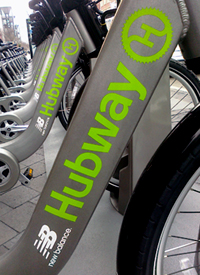 Boston’s Hubway bike share program is about to push beyond city limits, with an expansion over the Charles River into Cambridge and other communities starting as early as this week.
Boston’s Hubway bike share program is about to push beyond city limits, with an expansion over the Charles River into Cambridge and other communities starting as early as this week.
The Boston Globe reports the first of 24 new bike kiosks may start arriving in Cambridge this week and should operational by the second week in August. Somerville is slated to receive 12 stations with four planned in Brookline. The city of Boston launched the program in the summer of 2011. It now has 600 bikes for 61 stations and will add 11 new stations. With the expansion, the Boston region will have more than 1,000 public bikes available, The Boston Herald reported.
In Cambridge and Somerville, bike stations will be added at major squares and areas in between. In Brookline, new stations are coming to Coolidge Corner, Town Hall and the Brookline Village MBTA stop.
In Boston, new stations will be placed in Allston, Charlestown, Dorchester and Roxbury. Next year, Hubway may expand into Jamaica Plain, as well as Newton and Arlington, officials told The Boston Herald.
The expansion comes after a first year in which Hubway exceeded all expectations. It has seen twice as many trips and paid subscribers as planned. Over 360,000 individual bike trips have been taken since its start and this summer, tourists and commuters are taking about 2,000 bike trips per day.
The program is operated by Alta Bicycle Share in partnership with Boston Bikes, an initiative of the City of Boston. It is partially funded by the Federal Transit Administration. Outside Boston, each community and Alta Bicycle Share work together on securing grants and sponsorships to fund each bike station, which can cost $50,000.
The program offers Annual Membership for three seasons, which can be purchased online for $85. These members receive a key to unlock bikes for use. Rides under 30 minutes are covered under the membership fee; longer rides incur additional fees. Others can purchase short-term Access Passes for 24 hours or three days.
The Hubway reported few bike accidents resulting in injury during its first year. The program reported no bike accidents requiring ambulance response and only two bike accidents overall. The program’s contract requires riders to wear helmets to protect themselves in bike accidents. It encourages this by making helmets available for purchase when you buy a membership. It also has a network of retailers throughout the city who offer discounted memberships.
Related:
- Hubway, turning 1, is about to expand, The Boston Globe.
- Hubway expansion to bring another 400 bikes to roads, The Boston Herald.
- The Hubway.
- What to know about cycling in Boston, Breakstone, White & Gluck.


